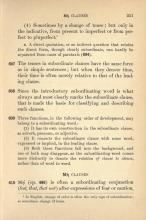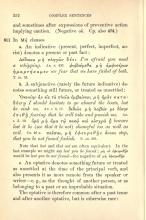610. Mή (cp. § 486) is often a subordinating conjunction (lest, that, that not) after expressions of fear or caution, and sometimes after expressions of preventive action implying caution. (Negative οὐ. Cp. also § 474.)
611. In Mή clauses
a. An indicative (present, perfect, imperfect, aorist) denotes a present or past fact.
Δέδοικα μὴ πληγῶν δἐει.
I'm afraid yοu need a whipping.
Aristoph. Clouds 493
φοβούμεθα μὴ ἀμφοτέρων ἡμαρτήκαμεν.
We fear that we have failed of both.
Thucydides 3.53.2
b. A subjunctive (rarely the future indicative) denotes something still future, or treated as unsettled.
Ὀκνοίην ἂν εἰς τὰ πλοῖα ἐμβαίνειν, μὴ ἡμᾶς καταδύσῃ.
I should hesitate to go aboard the boats, lest he sink us.
Xen. Anabasis 1.3.17
δεδιὼς μὴ λαβών με δίκην ἐπιθῇ
fearing that he will take and punish me
Xen. Anabasis 1.3.10
ὅρᾱ μὴ ἅμα τῷ κακῷ καὶ αἰσχρὰ ᾖ.
Beware lest it be (see that it be not) shameful too as well as evil.
Plato Crito 46a
παῦσαι, μὴ ἐφευρεθῇς ἄνους.
Stop, that you be not found foolish.
Soph. Antigone 280–281
Note that lest and that not are often equivalent. In the last example we might say lest you be found, μὴ οὐἐφευρεθῇς would be lest you be not found— the negative of μὴ ἐφευρεθῇς.
c. An optative denotes something future or treated as unsettled at the time of the principal verb, and also presents it as more remote from the speaker or writer e. g, as the thought of another person, or as belonging to a past or an improbable situation. The optative is therefore common after a past tense and after another optative, but is otherwise rare.
Ἔδεισαν οἱ Ἕλληνες μὴ προσάγοιεν πρὸς τὸ κέρας.
The Greeks feared they would advance on their flank.
Xen. Anabasis 1.10.9
ἐδόκει ἀπιέναι ἐπὶ τὸ στρατόπεδον μὴ ἐπίθεσις γένοιτο.
It seemed best to go back to the camp, lest an attack should be made.
Xen. Anabasis 4.4.22
ὑπαί τις ἀρβύλᾱς λῡ́οι, μή τις πρόσωθεν ὄμματος βάλοι φθόνος.
Let one undo my shoes, lest from afar an envious look should smite me.
Aesch. Agamemnon 944–947


